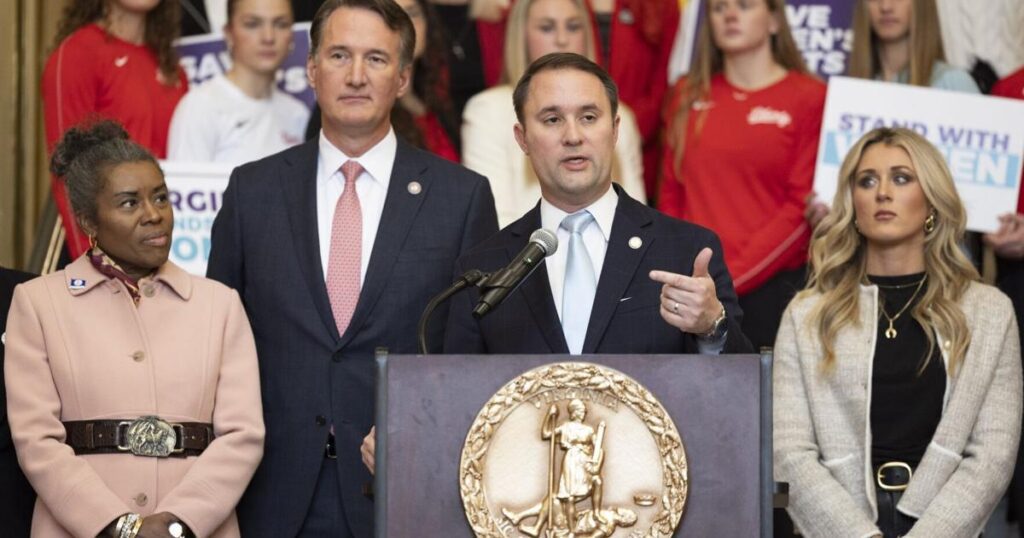Virginia GOP Leaders Advocate for Restrictions on Transgender Women in Sports
On Wednesday, top Republican officials in Virginia rallied together, urging the General Assembly to enact measures that would exclude transgender women—referred to by them as “biological males”—from participating in women’s sports.
This issue resonated deeply during President-elect Donald Trump’s campaign, particularly highlighted during a rally in Salem, where he praised the Roanoke College women’s swim team for their opposition to a transgender woman joining their ranks in 2023.
During a rally held in the lobby of the Barbara Johns Building, which houses the attorney general’s office, Gov. Glenn Youngkin, Lt. Gov. Winsome Earle-Sears, and Attorney General Jason Miyares discussed the contentious issue of transgender women in athletics, resulting in sharp partisan criticisms.
The officials called for the introduction of legislation spearheaded by Delegate Delores Oates (R-Warren) and State Senator Tammy Mulchi (R-Mecklenburg), aimed at preventing individuals identified as biological males from competing on high school or college sports teams designated for females. The proposed bills would require confirmation of a student’s biological sex through a signed physician’s statement.
Senator Mulchi expressed her hope for bipartisan support for the initiative. She recounted a personal story about her daughter’s experience on a co-ed soccer team, where she faced significant physical disadvantage against male opponents, culminating in a torn ACL injury that prevented her from playing soccer again.
Miayeres emphasized the notion that biological males who have undergone puberty boast inherent physical advantages in competition. “They jump higher and run faster. These aren’t opinions; they’re irrefutable facts,” he stated, detailing statistical disparities in physical strength and speed between male and female athletes.
Yougkin reiterated the urgency of the issue, framing it as a fight to uphold Title IX protections for women’s sports. “This is about safeguarding women’s and girls’ rights, ensuring fairness and safety,” he asserted. He highlighted the message sent to young female athletes when their hard work is undermined by the presence of biological males in their competitions.
Riley Gaines, a 12-time NCAA All-American swimmer, voiced her concerns at the rally, labeling it both unfair and hazardous for transgender women to compete in female sports, highlighting potential privacy issues in locker rooms. She reflected on her prior experiences with the Democratic leadership in Virginia, which she claims overlooked the needs of female athletes.
Gaines pointed out that the lack of strong leadership from state Democrats contributed to the ongoing struggles faced by female athletes, particularly those on the Roanoke College swimming team, who have encountered harassment and ostracism for voicing their objections against competing alongside transgender women.
Earle-Sears further emphasized the disadvantages posed to female athletes in competition with transgender women, asking the crowd to visualize the disparity in races where biological males transitioned from men’s divisions to dominate female categories.
National Legislative Landscape
The debate over transgender women in sports has also penetrated Congress. A recent vote in the U.S. House of Representatives led to the passage of a bill aimed at restricting youth sports participation based on biological sex, with all Republicans and two Texas Democrats voting in favor of it. Critics, including Rep. Jennifer McClellan (D-4th), denounced the bill as an attack on the transgender community masquerading as a protective measure for girls, arguing that it would require invasive scrutiny of young girls’ bodies.
Rep. Eugene Vindman (D-7th) acknowledged the necessity to protect women’s sports, but contested the bill’s approach as counterproductive to female athletics. In contrast, Rep. Jen Kiggans (R-2nd) voiced her approval of the legislation, calling it a significant advancement for women’s rights in sports.


